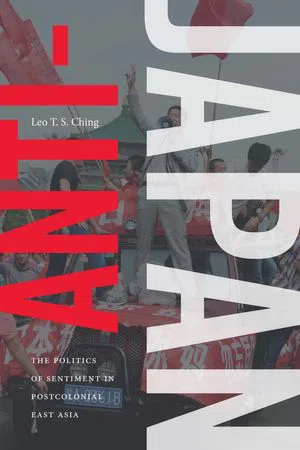
- English
- PDF
- Available on iOS & Android
Anti-Japan : The Politics of Sentiment in Postcolonial East Asia
About this book
Although the Japanese empire rapidly dissolved following the end of World War II, the memories, mourning, and trauma of the nation's imperial exploits continue to haunt Korea, China, and Taiwan. In Anti-Japan Leo T. S. Ching traces the complex dynamics that shape persisting negative attitudes toward Japan throughout East Asia. Drawing on a mix of literature, film, testimonies, and popular culture, Ching shows how anti-Japanism stems from the failed efforts at decolonization and reconciliation, the Cold War and the ongoing U.S. military presence, and shifting geopolitical and economic conditions in the region. At the same time, pro-Japan sentiments in Taiwan reveal a Taiwanese desire to recoup that which was lost after the Japanese empire fell. Anti-Japanism, Ching contends, is less about Japan itself than it is about the real and imagined relationships between it and China, Korea, and Taiwan. Advocating for forms of healing that do not depend on state-based diplomacy, Ching suggests that reconciliation requires that Japan acknowledge and take responsibility for its imperial history.
Frequently asked questions
- Essential is ideal for learners and professionals who enjoy exploring a wide range of subjects. Access the Essential Library with 800,000+ trusted titles and best-sellers across business, personal growth, and the humanities. Includes unlimited reading time and Standard Read Aloud voice.
- Complete: Perfect for advanced learners and researchers needing full, unrestricted access. Unlock 1.4M+ books across hundreds of subjects, including academic and specialized titles. The Complete Plan also includes advanced features like Premium Read Aloud and Research Assistant.
Please note we cannot support devices running on iOS 13 and Android 7 or earlier. Learn more about using the app.
Information
Table of contents
- Cover
- Contents
- Acknowledgments
- INTRODUCTION. Anti-Japanism (and Pro-Japanism) in East Asia
- ONE. When Bruce Lee Meets Gojira: Transimperial Characters, Anti-Japanism, Anti-Americanism, and the Failure of Decolonization
- TWO. “Japanese Devils”: The Conditions and Limits of Anti-Japanism in China
- THREE. Shameful Bodies, Bodily Shame: “Comfort Women” and Anti-Japanism in South Korea
- FOUR. Colonial Nostalgia or Postcolonial Anxiety: The Dōsan Generation In-Between “Retrocession” and “Defeat"
- FIVE. “In the Name of Love”: Critical Regionalism and Co-Viviality in Post–East Asia
- SIX. Reconciliation Otherwise: Intimacy, Indigeneity, and the Taiwan Difference
- EPILOGUE. From Anti-Japanism to Decolonizing Democracy: Youth Protests in East Asia
- Notes
- References
- Index